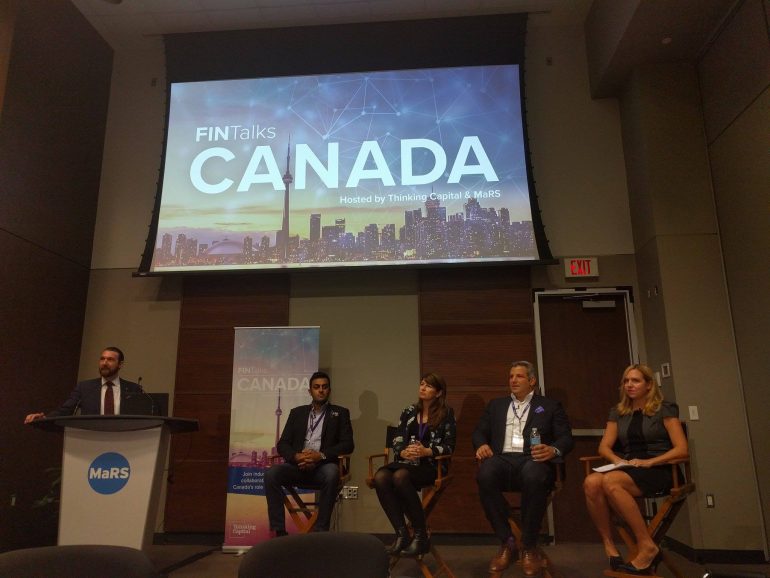In the words of Deloitte financial services head Rob Galaski, banks have gone from regarding FinTech disruption in Canada with “polite denial” and evolved to “a shared paranoia among execs.”
Galaski was kicking off the first in what will be an ongoing FINtalks series from Thinking Capital, which is meant to explore Canada’s place in the world of FinTech. To examine the trends in Canada’s FinTech ecosystem — and how we can catch up to fast-paced ecosystems like Hong Kong, the UK, and the US — Thinking Capital gathered bank execs, FinTech startups, and tech leaders for keynotes and panel discussions.
“One of the things that bigger banks struggle with — and they’re getting better at — is efficiency, speed, and attracting the right talent.”
“FinTech seems like random acts of violence, so you don’t really know where the next disruption is coming from, and you don’t know how to wisely allocate your growth capital,” Galaski said about the challenges that bank face. “But if you look at where the most change that’s happening in the industry, it’s actually pretty scientific. If you can figure out the biggest sources of friction to your customers, and intersect that with an overlay of where the greatest, undefended profit pools are, this is exactly where the work is taking place.”
Thinking Capital CEO Jeff Mitelman — who has been running the company since 2007 — seemed to agree, arguing that Thinking Capital has described itself as a “data shop that lends money” before it was labelled a FinTech. “Unstructured data and non-traditional data has been at our core right from day one. And I would say that so much of our IP and the way we think about our IP is the ability to take large pools of data that historically wasn’t used in credit modelling, and use it as a proxy to cash flow and creditworthiness.”
While Canada’s ecosystem is considered nascent in comparison the other markets, Adam Nanjee, head of financial technology and innovation at MaRS, says that also means there’s a lot of opportunity to come. “We haven’t really seen a Series B round raised for a FinTech company in Canada. And now, it’s not just about banks; everyone thinks it’s just banks and FinTech startups, but we have partnerships with acquirers and processors. Everyone wants to jump in on this train because there’s so much opportunity.”
Taking the perspective of someone working in Canada and the US, Facebook director of financial services Erin Elofson said that Facebook Canada has the opportunity to look at the ecosystem as a microcosm; the social network works with both senior bank leaders and CEOS of startups to find out how their services can fit into Facebook’s distribution network.
“Whether you’re a large bank or a brand new competitor in the marketplace, we democratize access to that network and we’re really excited about what we’re seeing,” Elofson said. “The Canadian banks have made a ton of progress in adopting our tools to drive growth.”
Rob Galaski from @DeloitteCanada says 3 things #fintech should watch out for in 2017: legal, regulatory & human capital #FINTalks @MaRSDD
— Thinking Capital (@ThinkingCapCA) November 8, 2016
While Elofson praised the banks for their openness to adopting Facebook’s tools, Lisa Boulanger, Google head of financial services industry and the Canadian payments lead, said there are still barriers that banks face due to their size. FinTechs often don’t know who the decision-makers are at the banks, and thus struggle to set the foundation for meaningful partnerships.
“One of the things that bigger banks struggle with — and they’re getting better at — is efficiency, speed, and attracting the right talent to get that innovation off the ground,” Boulanger said. “Something the FinTechs do well is attracting that talent, they have the speed and innovation but they don’t have the distribution. Pairing those two together is such a great opportunity.”
While FinTech and bank partnerships seem to be fueling the next generation of financial services, Galaski noted that one area that banks can lead — but is seldom discussed — is digital identity, which is at the heart of every transaction.
“It’s fair to say that the analog form of identity we all operate on now is a huge driver of cost and risk. So we think there’s a tremendous opportunity for financial institutions to use their position as regulated, generally trusted organizations to take the lead in the establishment of digital identity.”


